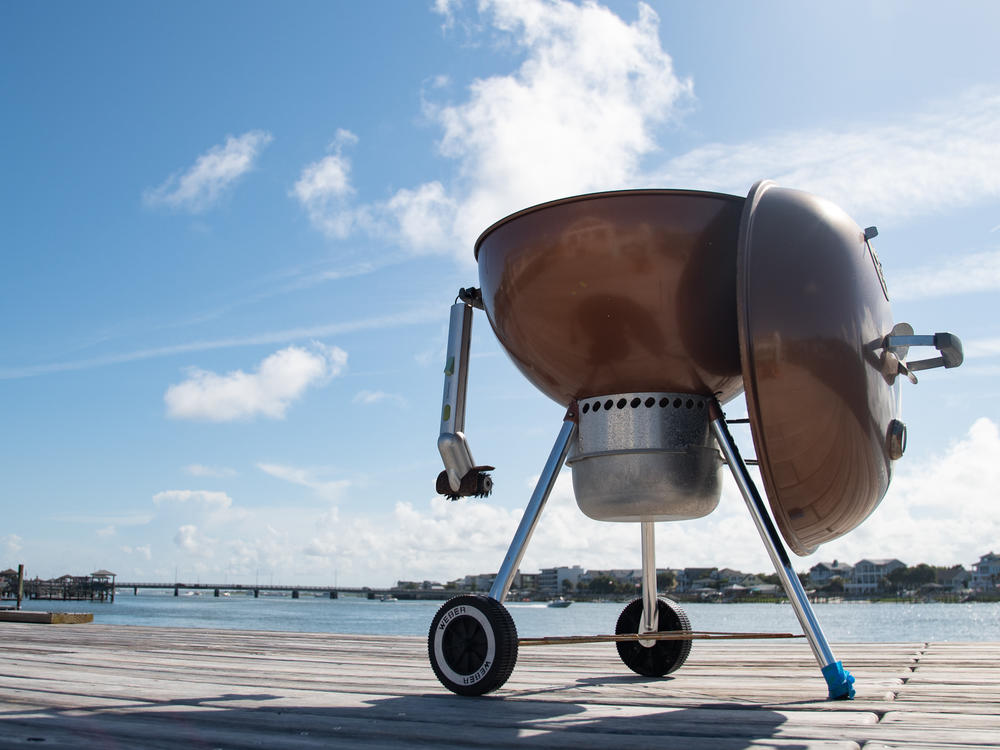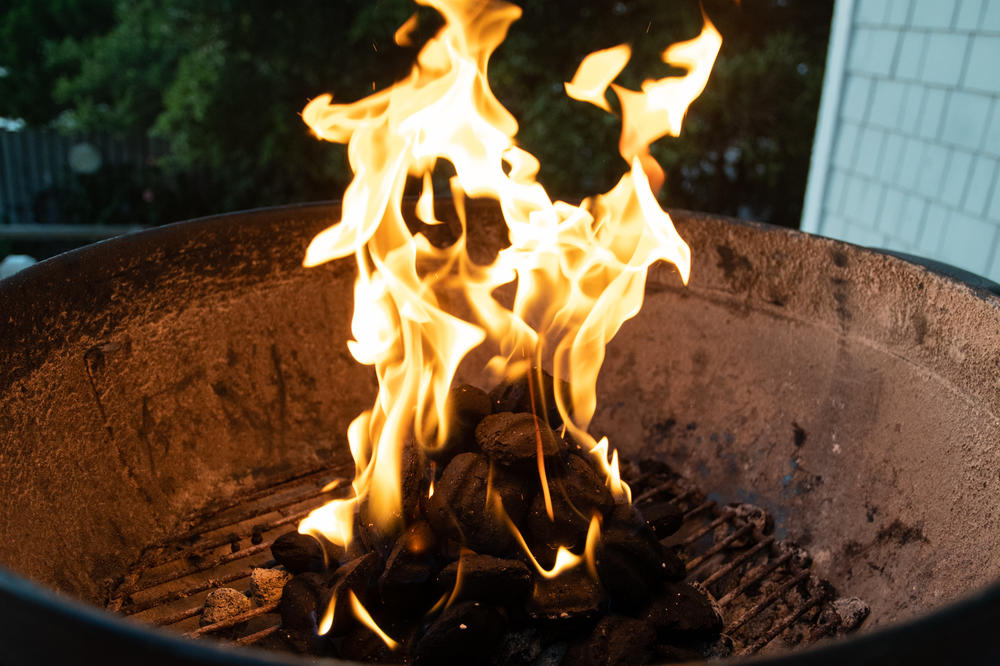Section Branding
Header Content
Backyard Grilling Seems Safe, Until It Isn't
Primary Content
Clinging to the back of a fire engine racing through the streets of El Paso, Texas, firefighter Michael Pritchard knew this fire was going to be bad.
"You could see the smoke from miles away," Pritchard recalls of the two-alarm blaze that gutted a garden apartment complex in the city.
It was the late '80s, and Pritchard had been with the El Paso Fire Department for about five years. He would go on to serve 26 years with the department and respond to dozens of grill fires, but only one has stayed with the veteran fire safety professional 30 years and two careers later.
This particular fire is indelible because it was so severe and entirely preventable. The cause of the fire? A charcoal grill, two 20-something women and one simple mistake.
The night before the fire ravaged the complex the two women grilled their dinner outside. After eating, they went to bed, leaving the charcoal to cool overnight. The next day, they disposed of the ashes in their kitchen trash. The pair left for work, and by midafternoon, the trash can was on fire.
The blaze first spread through their kitchen, then raced through the rest of their apartment and eventually engulfed the building in an inferno that sent black smoke high above El Paso.
Pritchard still remembers this fire because the two women did almost everything right. They cleaned the grill after they were done cooking. They grilled outdoors where the smoke could waft away. And they let the charcoal cool overnight.
But Pritchard says that overnight wasn't long enough. He warns that charcoal and ashes can stay hot for much longer than they may appear. So, when the women deposited the charcoal in their kitchen trash can the next morning, ashes smoldered for a few hours before igniting the can in the afternoon.
Grilling fires are a misunderstood risk
Pritchard is now chief of the Prevention and Information Branch of the U.S. Fire Administration, and he warns that today, too many Americans don't understand the risks associated with grilling. Barbecues and cookouts have become ingrained in our culture, especially around holidays such as Memorial Day or Independence Day, making them feel safe and familiar. But Pritchard warns that grill fires are still a very real risk.
Susan McKelvey of the National Fire Protection Association agrees. She adds that the overconfidence people feel when grilling in their backyards also stems from the location.
"People just feel safe at home," she says, "and so this overconfidence lends to a complacency."
This mindset can be devastating. Every year, according to the National Fire Protection Association, an average of 19,700 patients visit emergency rooms across the country with grilling-related injuries. Forty-eight percent suffered thermal burns, and 4 in 10 of these thermal burn patients are children under the age of 5.
As the two young El Paso women experienced firsthand, charcoal grills cause an average of 1,300 home fires across the country every year, according to data from the National Fire Protection Association. Gas grills are responsible for almost seven times as many blazes, with an average of 8,900 home fires caused by them annually.
These fires can be deadly. McKelvey points out that 80% of civilian fire deaths in the United States occur in home fires.
"Home fires happen each and every day," she says, "and nearly 3,000 people die in home fires every year. Most of them are preventable, the vast majority."
Practicing safe grilling habits is crucial. According to the Hearth, Patio & Barbecue Association, two-thirds of U.S. adults own a grill or smoker, and 68% of them plan on having a July Fourth cookout. If that includes you, make sure to review these key grilling safety tips.
As Pritchard likes to say, "Fire is everyone's fight."
Setting up your grilling station
When taking out your grill for the first time at the start of grilling season, McKelvey says it is essential to check for any nests, hives or animals roosted inside before cleaning off any excess grease or char from earlier use.
She also recommends setting your grill on a flat, sturdy surface at least 3 feet from any structure, such as your house or shed. Do not grill underneath a deck, an awning, eaves, an umbrella or tree branches. Be mindful of the grill's vicinity to dry vegetation, tablecloths and outdoor décor such as balloons or banners.
Propane grill safety
If you're using a propane grill, regularly check for leaks and always check before the first use of the season. McKelvey suggests performing the soapy water test. Mix a little dish soap or detergent with water and brush or spray the solution onto the hose and connectors. Turn the gas on. If bubbles form, turn the gas off immediately — you have a leak and will need to repair or replace the hose or tank.
When starting your gas grill, Pritchard says it is critical to keep the lid open. A closed lid can cause gas to accumulate, which can lead to an explosion when you light the grill.
After you're done grilling, National Fire Protection Association guidelines recommend storing propane tanks in an upright position at least 10 feet from doors, windows or dryer vents, and at least 20 feet from your home's air intake vents. Do not store propane in a garage.
Charcoal grill safety
When using a starter fluid to help ignite charcoal, McKelvey says that you should only use a fluid made for charcoal. Do not use other flammable or volatile substances.
When you're done grilling, cool the charcoal and ashes completely. Grill manufacturers Kingsford and Char-Broil both recommend closing the lid to suffocate the embers and leaving the ashes to cool for 48 hours. To speed up the cooling, douse the embers with water. When it's time to dispose of the cooled ashes, place them in a metal container such as an old coffee can or wrap them in foil before placing the package in a garbage can with a lid.
While you're grilling
As much as you may be tempted to dress to impress, McKelvey says that the clothes you wear when grilling should not be loose fitting or have dangling fabric. And be mindful of jewelry or watches that can conduct heat when you're exposed to the grill for long periods of time.
She also recommends gathering your food, platters, utensils and other grilling materials before you begin cooking. An unattended grill is a dangerous grill. If you are hosting an event, McKelvey says that a smart practice is designating a family member or friend to be in charge of grabbing drinks and entertaining guests so you never have to leave the grill. Pritchard also adds you should use long handled grilling utensils to prevent getting burned.
Both McKelvey and Pritchard insist that one nonnegotiable practice is keeping children and pets at least 3 feet away from the grill at all times. Pets should stay indoors or in a confined area outdoors. McKelvey recommends taping bright colored duct tape on the ground to mark off a boundary easily visible to children.
"Little things can make such a big difference," she says. "It's not rocket science."
Daniel Lam is an intern on NPR's National Desk.
Copyright 2021 NPR. To see more, visit https://www.npr.org.



